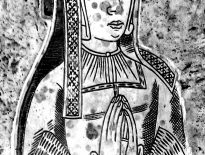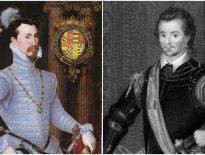 Sometimes my research leads me off on a tangent and that really is the joy of historical research, suddenly finding a little nugget of information that piques your interest and leads you off on a journey of discovery.
Sometimes my research leads me off on a tangent and that really is the joy of historical research, suddenly finding a little nugget of information that piques your interest and leads you off on a journey of discovery.
While I was looking at this week's "on this day in history" events from my book On This Day in Tudor History, I noticed that an entry for the 31st May was the death of Katherine Brettergh (née Bruen) in 1601:
"Death of Katherine Brettergh (née Bruen), 'exemplar of godly life'. Her biographer, Steve Hindle, writes of her deathbed crisis of faith "during which she raged against God's unmercifulness and threw her Bible repeatedly to the floor", and how "Her agonies formed the centrepiece of a polemical account of her embattled life appended to the two sermons preached by William Harrison and William Leigh at her funeral", and which were published. Her crisis, they said, was a struggle between God and Satan for her soul."
What an interesting sounding lady!
I decided to research her a bit more, and here is what I found.
Katherine Brettergh was the daughter of John Bruen and his wife, Dorothy (née Holford). Her exact birthdate is unknown but would have been a few days before her baptism on 13th February 1579. She was born at Bruen Stapleford, in Cheshire, in the north-west of England. Her father died when she was just eight years old, so Katherine, along with ten of her siblings, was brought up by her eldest brother, John Bruen, who was nineteen years her senior. John's biographer, Steve Hindle, writes that John "imposed a strict code of piety on the household. He began by disparking the estate and suppressing hunting and gaming, and subsequently enforced a culture of discipline on family, servants, and tenants alike. This not only involved prayers seven times daily but also attendance at both morning and evening sermons on Sundays, usually without departing from the church in between."
With an upbringing like that, it is no surprise that Katherine went on to marry a pious man. She married William Brettergh of Brettergh Holt, near Liverpool, in around 1599 and set up home at Little Woolton in Childwall, Lancashire, where they had a daughter, Anne. Katherine and her husband attended church every Sunday and would read at least eight chapters of their Bible per day. Their Protestant piety led to them being harassed and mocked by some of the Catholics in their parish, including a local priest and a local lord of a manor. In 1600, Katherine's husband, who was High Constable of West Derby, set out to arrest Catholic recusants in their local parishes, an action which Hindle describes as provoking "not only a full-scale riot but the maiming of Brettergh's cattle on two separate occasions over the following months." In THE CHRISTIAN LIFE AND DEATH, OF MISTRIS KATHERIN BRETTERGH, William Harrison wrote: "It is not unknowne to Lancashire what horses and cattell of her husband's were killed upon his grounds in the night most barbarously at two seuerall times by seminarie priests (no question) and recusants that lurked thereabouts" and noted that it was a "hinderance... being all the stocke hee had".
Katherine died on 31st May 1601, Whit Sunday, from a "hot burning ague", at the age of just twenty-two and it was on her deathbed that she appears to have had a crisis of faith. I'll give you a link to an online transcript of William Harrison's book on Katherine, but here is an excerpt regarding her behaviour on her deathbed:
"First, the seuerity of Gods iustice, and the greatnesse of her sinnes began to come into her minde, which much afflicted her, and shee would often speake of it. Then shee accused her selfe of pride, that shee had delighted to much in her selfe, and her beauty. Afterwards she thought she had no faith, but was full of hypocrisie, and had not embraced religion so earnestly, nor glorified God so worthily (especially with her tongue, which oft she repeated) nor loued him so sincerely, as she ought to haue done. Sometime she would cast her Bible from her, and say: It was indeed the booke of life, but shee read the same vnprofitably, and therefore feared it was become to her the booke of death. Sometimes she would say her sinnes had made her a prey to Satan; a spectacle to the world; a disgrace to religion; and a shame to her husband, kindred, and all true Christians: and here she would weepe bitterly. Sometime the originall corruption wherein she was borne, troubled her, and the sinnes of her parents, and the common parents of all, the eaters of the forbidden fruit: as if that had made her vnworthy of God, and were then laid to her charge. Many times shee accused her selfe of impatience, bewailing the want of feeling Gods Spirit, and making doubt of her election, and such like infirmities. She wis [...]d, that she had neuer been borne, or that shee had been made any other creature, rather than a woman. She cried out oftentimes, Woe woe, woe, &c. a weake, a wofull, [...] wretched, a forsaken woman, and such like pitifull complaints against her selfe, with teares continually trickling from her eyes. She complained of grieuous thirst, such as all the water in the sea could not quench (and yet when drinke was giuen her, sometimes refused it, sometimes tooke a very little of it:) sw [...]at burst out vpon her exceedingly, and sometime her body burned extreamely. So it seemed the sorrowes of death hemm'd her in, and the griefes of hell laid hold vpon her. Sometimes she was very dull in prayer, and once when shee should haue said, Leade vs not into tentation, shee made a stop, saying, I may not pray; I may not pray (being interrupted, as she said, by Satan) and so shewed much discomfort: howbeit she was not [...]fe till [...]e could both pray, and make confession of her faith with speciall application to her selfe. Besides these [...]ry darts of Satan, she was once or twice troubled with vaine speeches, as of her childe, the killing of her husbands cattell, that shee thought shee saw a [...]re by her, &c. But euery one saw that these things proceeded of weaknesse, emptinesse of her head, and want of sleepe, which her disease would not affoord her.
These [...]its, though they were for the time grieuous to her selfe, and discomfortable to her friends; yet were they neither long, nor continuall, but in the very middest of them would shee oftentim [...] giue testimony of her faith, striuing and fighting against her tentations. Many times when the [...]landers by iudged her afflictions at the sharpest, would shee call vpon God, lifting vp her eyes and hands to heauen, and desire him to giue her strength against her tentations. Many times with a cheerefull countenance she would desire those that were by, not to faint, or to giue her ouer, but constantly to pray, and helpe her against the tempter. Once in the midd'st of her tentation, being demanded by Master William Fox: whether she did beleeue the promises of God, or no? and whether she could pray? she answered. O that I could, I would willingly but hee will not let me. Lord I beleeue, helpe my vnbeleefe: which she pronounced with a still voyce. And when he replied, that if she had a desire to pray and beleeue, she did pray and beleeue, and that so effectually, that hell gates should not ouercome her, according to that of the Apostle: God accepteth it according to that a man hath, not according to that a man hath not: she was much comforted thereby.
Once after a great conflict with Satan, she said: Satan reason not with me, I am but a weake woman, if thou haue any thing to say, say it to my Christ; he is my advocate, my strength, and my redeemer, and he shall pleade for me. Sometimes when she was afflicted with the accusation of her sinnes, and want of feeling Gods mercy, she would with many a pitifull sob and much weeping, pray to the Lord Iesus Christ, to helpe and comfort her a poore, wofull, distressed woman, and requested others to pray for her. And when shee was mooued to make confession of her faith, she would doe it oftentimes, saying the Apostles Creed, and concluding the same with words of application to her selfe. I beleeue the remission of (my) sinnes, the resurrection of (my) body, and eternall life (to me) Amen. And hauing done, shee would pray God to confirme her in that [...]aith, euer concluding with the Lords prayer, as deuoutly and reuerently as any that were present. A Christian friend, who by his dayly attendance on her, discharged the duty of a faithfull Christian, standing by told her that no tentation had be fallen her, but that which appertained to the childe of God, and that God is faithfull and true, and had promised to giue an issue with the tentation: whereas she expressed great comfort."
Harrison explains that Edward Aspinall, a "faithfull professour of the truth" ministered to her in her end days, comforting her with scripture which "put the the sword of the spirit into her hand", but Katherine still struggled with what she saw as her "weakness". Aspinall reminded Katherine of Christ's words on the cross "My God, my God, why hast thou forsaken me?" and his heavy soul, and that helped her.
"After this, hee read vnto her the 22. Psalme, wherein Dauid complained partly of his owne, but principally of the most bitter anguish which our Sauiour Christ endured, and suffered in body and soule, putting her in minde, that her case was not so bad as Davids, not much vnlike our Sauiours, who endured all that, and more for her; and therefore she had no cause to feare, seeing Christ had obtained victory, and would vndoubtedly bee with her, deliuer her, and eternally glorifie her with himselfe for euermore; and so continually hee propounded to her such comfortable places of Scripture as might meete with her infirmities. This greatly refreshed her, and gaue her occasion many times to call vpon God, for increase of grace, and deliuerance from her grieuous temptations: The which God of his accustomed goodnesse vouchsafed, on Tuesday, about three a clocke in the afternoone, what time shee felt her selfe in very good measure deliuered from all her former feares and afflictions. But on Saturday next after, which was the day before her death, shee was wholly released, and filled with such inward comfort, that it greatly affected vs that saw it."
As I said at the start of this article, Harrison saw Katherine's torment in her last days as a struggle between God and Satan. Harrison
concluded "I make no question it was the worke of God in her, to suffer Satan to accuse her, and afflict her for her sinnes, that so shee might the better see them, and consider the ha [...]nousnesse of them, and before her departure repent her of them, and betake her wholly to Christ for the sauing of her soule."
From the Tuesday when she felt comforted until the Sunday when she died, Harrison said that her comfort was increased and "temptations banished away". She prayed with visitors, sang psalms, read her Bible, and on the final Saturday, the day before she died, "the Lord disclosed himselfe in mercy, to her more plentifully, than euer before" and "her countenance ioyfull: her tongue flowing with the praises of God: and her voyce as most heauenly musicke and melody of peace, sounding praise, and honour, and glory to God in a wonderfull manner, as followeth." Harrison goes on to give an account of her death:
"With that, all that were present did ioyne in prayer with her, and in conclusion [...]sing the Lords prayer, which she said with them, to thine is thy kingdome; her strength then being gone, her tongue failed her, and so shee lay silent for a while, euery one iudgeing her then to be neere death, her strength and speech failing her: yet after a while lifting vp her eyes with a sweet countenance and still voyce, said: My warfare is accomplished, and my iniquities are pardoned. Lord, whom haue I in Heauen but thee? and I haue none in earth but thee: my flesh faileth, and my heart also, but God is the strength of my heart, and my portion for euer. He that preserueth Iacob, and defendeth his Israel, he is my God, and will guide me vnto death: guide mee O Lord my God, and suffer me not to faint, but keepe my soule in safetie. And with that she presently fell asleepe in the Lord, passing away in peace, without any motion of body at all; and so yeelded vp the Ghost, a sweet Sabbaths sacrifice about foure of the clocke in the afternoone, on Whitesunday, being the last of May, 1601."
Harrison went on to say:
"This was the death of that vertuous Gentlewoman, happily dying in the Lord, and reaping the benefit of a holy profession: wherein wee cannot but acknowledge and reuerence the mercie of God, who in our greatest infirmitie makes his grace to shine most clearely. A sure testimony of the truth of our profession, seruing to incourage vs therein, and to moue vs to a godly life."
Katherine was buried on 3rd June 1601 at Childwall Church.
You can read Harrison's full account of Katherine's life at http://tei.it.ox.ac.uk/tcp/Texts-HTML/free/A02/A02734.html.
Notes and Sources
Picture: All Saints Parish Church, Childwall, cc-by-sa/2.0 - © Sue Adair - geograph.org.uk/p/70992.
- Harrison, William (1634) THE CHRISTIAN LIFE AND DEATH, OF MISTRIS KATHERIN BRETTERGH, LATE wife of Master WILLIAM BRETTERGH, of Bretterghoult, in the Countie of Lancaster Gentleman. With the manner of a bitter conflict shee had with Satan, and blessed conquest by CHRIST, before her death, to the great glory of God, and comfort of all beholders., Felix Kyngston.
- Hindle, S. (2004-09-23). Brettergh [née Bruen], Katherine (1579–1601), exemplar of godly life. Oxford Dictionary of National Biography.
- Hindle, S. (2004-09-23). Bruen, John (1560–1625), iconoclast. Oxford Dictionary of National Biography.
- Ridgway, Claire (2012) On This Day in Tudor History, MadeGlobal Publishing.



Wow a local girl. I will have to visit Childwall on Saturday and see her tomb in the Church.
Woolton, West Derby and Childwall are all included in the Lost Villages of Liverpool and of course are now incorporated into the city outskirts. Wow, this is ten minutes by bus.
Thanks for this exciting article.
I hope you can find her tomb, do let us know if you do.
RealTudorLady, how fortunate that you’re so close by. I hope you report back to us and let us know what you found there.
Thank you, Claire, for such an interesting article. Such awful treatment of these people, having the husband’s cattle killed then the wife being so sick must have caused a terrible crisis for the family. I wonder what became of her daughter and husband after her death? Her crisis of faith seemed to be extreme, and I wonder if some of her behavior could have been caused by high fevers and the illness itself. This is a good example of how religion was so central in people’s lives and ruled in everything they did. It’s a very sad story.
Hi Sandra,
Katherine’s husband remarried in 1602. He married Anne Hyde of Urmston and they had a son, Nehemiah, together. Apparently, Nehemiah was known for his drunkneness!
I haven’t been able to find out what happened to Katherine’s daughter, Anne.
Yes, I think her illness probably had a lot to do with what she was going through as a fever must surely have caused delirium, but I think the fact that she was dying must also have caused her concern regarding her faith. At least she was comforted in the end.
What a fascinating, and highly personal, insight into the death of Katherine Brettergh. Similarly, the information on her daily routine of seven prayers and strict household etiquette is testimony to the influence of reformed religion during this period.
Another, similar, example of this kind of recorded death can be found in Philip Stubbs’ ‘A Christal Glasse for Christian Women’. It is essentially a biography of his wife, Katherine Stubbes, with an emphasis on her ‘godly’ death. Similar to Mrs Brettergh, Katherine Stubbs’s character was wholly ideal; being pious, quiet and following the word of God. However, she too had a conflict ‘betwixt satan and her soul’. The pamphlet records, in detail, the final days of her life. She too suffered from a ‘extreme hot and burning ague’ – becoming delirious and thrashing out against her a little puppy she had once enjoyed, speaking out against the power of Satan and his temptations on her soul.
This piece became highly influential and passed through thirty-four editions. I’ll put the link below to the whole pamphlet for anyone interested.
http://www.wicked-good-books.com/wp-content/uploads/2014/01/02v-EXTRACT-STUBBS5.pdf